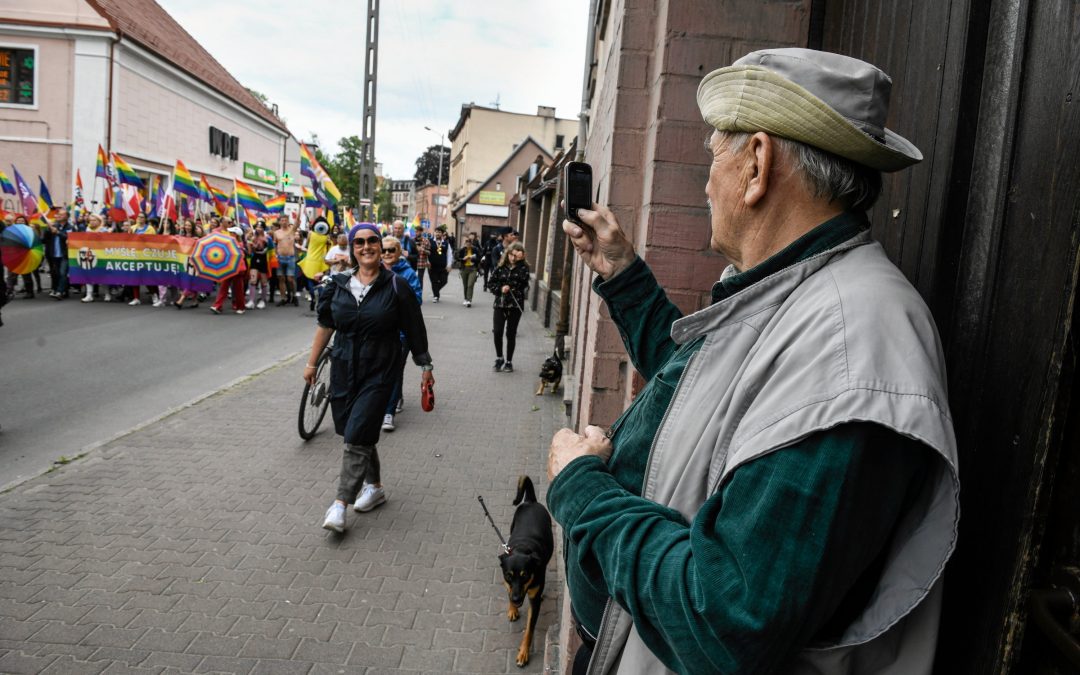On Sunday, an LGBT equality march passed through the streets of Milicz. While such parades are increasingly common and well attended in Poland, never has one been held in such a small town, with Milicz having a population of just over 11,000.
“History is happening here, so remember this day,” said Agnieszka Dziemianowicz-Bąk, an MP from The Left (Lewica), speaking in the market square of the town, which lies 55 kilometres north of Wrocław in Lower Silesia province.
“Change will not happen in the squares of the largest cities,” she continued. “We already have Warsaw, Kraków and Wrocław, where there have been equality marches for years. But here, in Milicz, is a real change for equality, love and acceptance.”
Milicz now, 11 tysięcy mieszkańców, pierwszy marsz równości❤🌈! @MorawieckiM żądamy równych praw!#LGBT #LGBTQ 🏳️🌈🏳️🌈🏳️🌈 pic.twitter.com/Y7HnljSKAt
— Robert Maślak (@RobertMaslak) May 22, 2022
The organisers – a local NGO called Myślmy – had expected around 100 people to attend, but there were two or three times that number, reports liberal daily Gazeta Wyborcza. Some, like Dziemianowicz-Bąk, were politicians and activists who had come from elsewhere.
There was a heavy police presence at the event in Milicz at the request of the organisers, who were concerned that football fan groups could come to oppose it. Those fears proved unfounded, however, with no protests taking place.
Maszerujemy dla równości w Miliczu💪 Bo miłość jest wszędzie i równość jest wszędzie❤️🌈 pic.twitter.com/S78DDGqnoX
— Bartek Ciążyński (@BartekCiazynski) May 22, 2022
When the newspaper spoke to some elderly locals who were watching the march, they said they had no problem with LGBT people and “liked the fact the march was colourful”.
One man, however, expressed hostility, saying “these are not people”. Those remarks echo comments by President Andrzej Duda, who during his re-election campaign in 2020 declared that “they try to tell us that [LGBT] are people, but it is an ideology”.
Poland’s first LGBT equality march was held in Warsaw in 2001, though in 2004 and 2005 the city’s then mayor, Lech Kaczyński of the national-conservative Law and Justice (PiS) party, issued a ban on the event. His decision was later found to have violated both the Polish constitution and the European Convention on Human Rights.
By contrast, the city’s current mayor – Rafał Trzaskowski of the centrist Civic Platform (PO) – has lent the event his honorary patronage and himself attends the march. In 2019, the last parade before the pandemic, around 50,000 people participated in the event.
Other large cities – such as Kraków, Poznań, Katowice and Wrocław – also began holding parades in the first decade of this century, though they often initially faced violent opposition from nationalist groups.
Over the last five years, many smaller cities and towns have begun to host equality marches, though they have often faced opposition from local politicians. Lublin’s mayor, Krzysztof Żuk of the centrist Civic Platform (PO), attempted to have the parade banned on public safety grounds, but was overruled by courts.
Police have clashed with nationalist protesters during Lublin's first ever #LGBT march #MarszRowności. Water canon and stun grenades were used, reports @wirtualnapolska. The mayor tried to ban the march because of potential violence from counter-protesters pic.twitter.com/M7FMCvHDAc
— Notes from Poland 🇵🇱 (@notesfrompoland) October 13, 2018
Lublin’s first LGBT march in 2018 saw violent clashes between police and nationalist protesters, as did Białystok’s the following year. At the latter event, protesters threw paving stones at marchers and the police, and in Lublin a couple were convicted for bringing a homemade explosive to protests against the parade.
Before yesterday’s march in Milicz, the smallest town in Poland to have hosted an LGBT parade was Słubice, with a population of almost 17,000. In 2020, it held the first ever joint Polish and German LGBT march, which started in Słubice then crossed the border to Frankfurt (Oder) in Germany.
Yesterday, Gryfino – a town of 20,000, also on the border with Germany – also hosted its first LGBT march, with local media reporting dozens of participants. On 4 June, Sanok – a town of 37,000 in the conservative southeast of Poland – is due to see its first parade.
The spread of LGBT events across Poland comes as polls show growing acceptance for certain LGBT rights. Same-sex civil partnerships are now supported by a majority of the public, according to pollster Ipsos, though state research agency CBOS finds a lower level of support of around 36%.
Recent years have also seen a concerted anti-LGBT campaign led by the ruling national-conservative Law and Justice (PiS) party as well as parts of the Catholic church. Around 100 local authorities have passed anti-LGBT resolutions, many of which declare themselves “free from LGBT ideology”.
Main image credit: Tomasz Pietrzyk/Agencja Wyborcza.pl

Daniel Tilles is editor-in-chief of Notes from Poland. He has written on Polish affairs for a wide range of publications, including Foreign Policy, POLITICO Europe, EUobserver and Dziennik Gazeta Prawna.




















